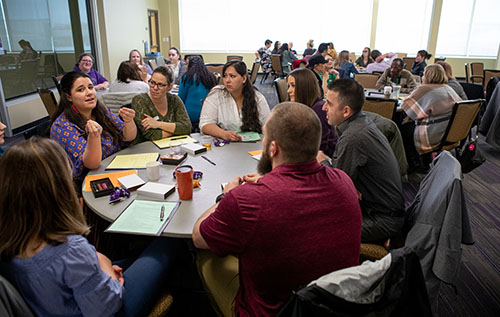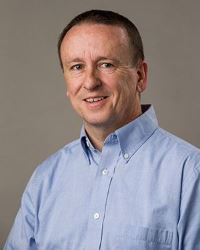Weber State Launches New Master of Social Work Degree to Address National and Local Shortages of Professionals
OGDEN, Utah – Next year, northern Utah will be home to a new master’s program in social work at Weber State University, addressing an area of dire need across the region. The program, housed in the College of Social & Behavioral Sciences, is currently accepting applications, which are due Dec. 1 for students aiming to start the program in fall 2021.
 Weber State will be the fourth university in Utah to offer a Master of Social Work (MSW), joining Utah State University, University of Utah and Utah Valley University. The university’s new MSW program will focus on clinical social work practice, spending more time training students to provide therapy than generalist programs do, said Mark Bigler, professor and chair of the Department of Social Work and Gerontology at Weber State.
Weber State will be the fourth university in Utah to offer a Master of Social Work (MSW), joining Utah State University, University of Utah and Utah Valley University. The university’s new MSW program will focus on clinical social work practice, spending more time training students to provide therapy than generalist programs do, said Mark Bigler, professor and chair of the Department of Social Work and Gerontology at Weber State.
“We wanted to be unique. That’s certainly part of the reason we chose a clinical emphasis,” Bigler said. “It gives graduates from our master’s program a bit of a leg up in a growing area of demand.”
The program’s clinical focus was also determined in collaboration with community partners, Bigler said, who report facing significant difficulty filling clinical positions that require a master’s level credential in the field.
“There’s a national shortage in this profession, which provides treatment for mental health and substance abuse,” said Kevin Eastman, executive director of Weber Human Services, the public agency responsible for providing many of these services for Weber County. Eastman has been an advocate for the new program because therapists who provide treatment at WHS are required to have a master’s degree in social work or another counseling discipline. Social work is the preferred discipline because both Medicaid and Medicare accept those credentials.
“Currently, I have six vacancies, and I can’t fill them because there’s nobody out there with the appropriate education looking for work,” Eastman continued. “I really value my partnership with Weber State and the conversations I've had with Dr. Bigler around evidence-based practices and high-quality treatment. Dr. Bigler understands the importance of having treatment that works. The shortage in the field is more than just trying to create access to treatment by filling positions. We need well educated graduates who are ready to learn even more when they step into the real world. WSU will get them ready for that.”
Weber State already has a thriving undergraduate program in social work, which produces 50-75 social workers each academic year, providing a solid foundation for a master’s program.
Discussions about starting the MSW program at Weber State became more urgent in 2016, Bigler said, when the Utah Medical Education Council published a report about the state’s shortage of mental health professionals. The report found the state had 209 mental health providers per 100,000 people, compared to the national average of 311 providers per 100,000 people. In order to match the national average, the state would need to more than double its mental health workforce by 2030, the report projected. A 2019 report from the Kem C. Gardner Policy Institute at the University of Utah made a similar projection, highlighting that Utah will also face a higher demand for services, since the state has a high rate of adults who experience mental health problems, and suicide is the leading cause of death for Utahns ages 10 to 24.
 Weber State’s new MSW program will help surrounding counties move toward this goal, since the program will likely attract locals who will stay in the area after graduating, Bigler said. Another benefit of local graduates is that they’re already familiar with the communities in which they’ll work.
Weber State’s new MSW program will help surrounding counties move toward this goal, since the program will likely attract locals who will stay in the area after graduating, Bigler said. Another benefit of local graduates is that they’re already familiar with the communities in which they’ll work.
“When a person is working in a community in which they’re invested — the community where they were born and raised, the community they know and love, or the place where they live and work — they’re a lot more motivated, and they may have a better understanding of the culture and customs,” Bigler said. “While our program will take a global perspective, we really are emphasizing local community needs in the intermountain region, paying particular attention to the growing Latino community.”
Eduardo Franco, a recent graduate of Weber State’s undergraduate program in social work who now works for the university as a TRIO Talent Search advisor, said his positive experience as an undergraduate makes him interested in returning as a graduate student after he’s gained some work experience.
“When I took an introductory class to social work, I felt at home,” Franco said. “I felt a calling toward doing something like that. I also think Weber State has a really good program. It was something that was challenging, which is good because it prepares you if you ever want to get a master’s degree.”
The new MSW will be a traditional two-year program, but the Department of Social Work and Gerontology is planning to launch a one-year program to start in 2022 for students who already hold a bachelor’s degree in social work.
For more news about Weber State University, visit weber.edu/wsutoday.
For photos, click on this link.
Megan Olsen, Office of Marketing & Communications
801-626-7948 • meganolsen9@weber.edu- Contact:
Mark Bigler, professor and department chair of the Department of Social Work and Gerontology
mbigler@weber.eduKevin Eastman, executive director of Weber Human Services
801-625-3601 • kevine@weberhs.orgEduardo Franco, graduate of social work bachelor’s program, TRIO Talent Search advisor
eduardofranco@weber.edu